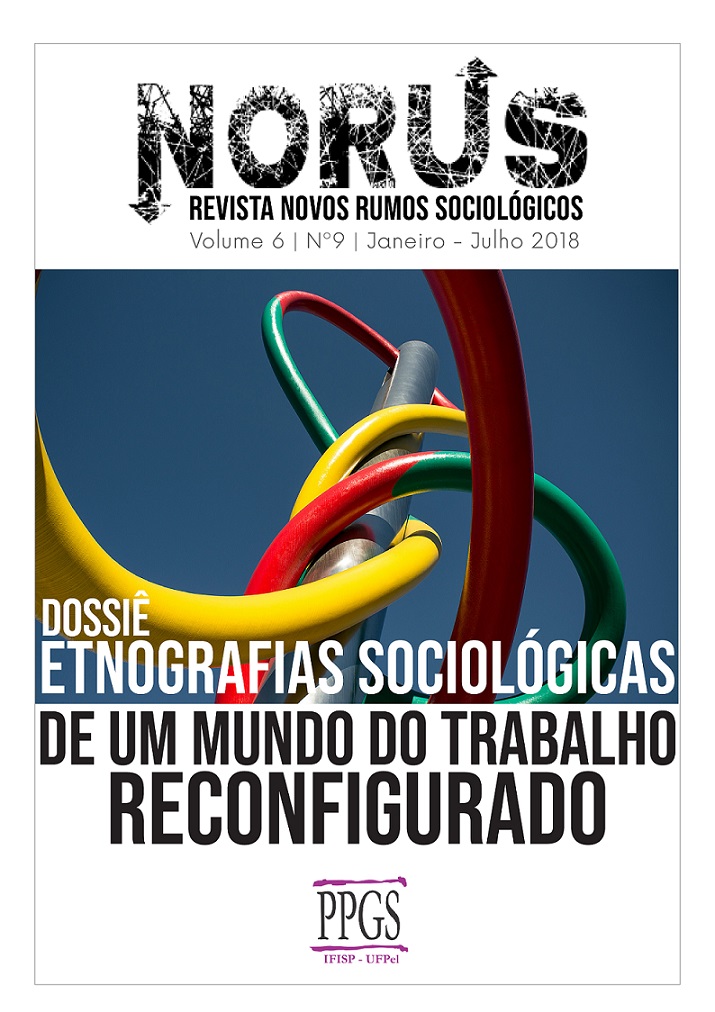Etnografía, Teoría Fundamentada y Frónesis: La Relevancia del Contexto
Resumo
En este artículo discutiré la relevancia del contexto para entender lo social. Sostengo que al reducir la realidad social a modelos estructurados, cerrados y predictivos, las posibilidades de comprender la vida humana se ven severamente restringidas. Baso esta idea en las nociones del sociólogo danés Bent Flybvjerg sobre el rol del término arsistotélico frónesis en la investigación sociológica. Trataré, además, de establecer como la frónesis es útil para enfoques cualitativos claves como la teoría fundamentada y la etnografía. Finalmente presentaré un ejemplo de trabajo empírico desarrollado dentro de dos fábricas de una empresa de productos lácteos en Uruguay (CASTLETON 2017).Referências
AAGAARD, Jesper. Striving for experiential resonance: Critique, postcritique and phenomenology. Qualitative Studies, vol.1, n.37, 2018.
ADLER, Patricia; ADLER, Peter & FONTANA, Andrea. Everyday life sociology. Annual Review of Sociology, vol.13, n.1, 1987.
ALTHEIDE, David. The sociology of Alfred Schutz. In: DOUGLAS, John; JOHNSON, John. Existential Sociology. Cambridge: Cambridge University Press, 1977.
ASPERS, Patrik; KOHL, Sebastian. Heidegger and socio-ontology: A
sociological reading. Journal of Classical Sociology, vol.13, n.4, 2013.
ATENCIA PÁEZ, José María. Ortega y Gasset, meditador de la técnica. Argumentos de Razón Técnica, n.6, 2003.
BELLAH, Robert; SULLIVAN, William; SWIDLER, Ann; TIPTON, Steven. Habits of the Heart: Individualism and Commitment in American Life. Berkeley: University of California Press, 1985.
CALLON, Michael. Some elements of a sociology of translation: domestication of the scallops and the fishermen of St Brieuc Bay. The Sociological Review, n.32, 1984.
CALLON, Michael; LAW, John. After the individual in society: Lessons on collectivity from science, technology and society. Canadian Journal of Sociology/Cahiers Canadiens de Sociologie, n.22, 1997.
CASTLETON, Alexander. Reestructura y cambio social en “la casa”: el caso de una fábrica uruguaya. Revista Latinoamericana de Antropología del Trabajo, vol.1, n.1, 2017.
CHARMAZ, Cathy. Constructing Grounded Theory: a Practical Guide
Through Qualitative Theory. London: Sage Publications, 2006.
DREYFUS, Hubert. Skillful Coping: Essays on the phenomenology of
everyday perception and action. Oxford: Oxford University Press, 2014.
FONTANA, Andrea. Introduction: Existential Sociology and the Self. In: KOTARBA, Joseph A.; FONTANA, Andrea. The Existential Self in Society. Chicago: University of Chicago Press, 1987.
FLYVBJERG, Bent. Phronetic planning research: Theoretical and
methodological reflections. Planning Theory & Practice, vol.5, n.3, 2004.
______. Making social science matter: Why social inquiry fails and how it can succeed again. Cambridge: Cambridge University Press, 2001.
______. Five misunderstandings about case-study research. Qualitative inquiry, vol.12, n.2, 2006.
______. Social science that matters. Foresight Europe, n.2, 2005.
GLASER, Barney; STRAUSS, Anselm. Discovery of grounded theory:
Strategies for qualitative research. Chicago: Aldine, 1967.
GÜBER, Rosanna. La Etnografía: Método, campo y reflexividad. Buenos Aires: Siglo Veintiuno Editores, 2011.
HARAWAY, Donna. Situated knowledges: The science question in feminism and the privilege of partial perspective. Feminist studies, vol.14, n.3, 1988.
LATOUR, Bruno. Reassembling the Social: An Introduction to Actor-
Network Theory. Oxford: Oxford University Press, 2005.
LATOUR, Bruno; WOOLGAR, Steve. Laboratory Life: The Social
Constructionof Scientific Facts. London: Sage, 1977.
LAW, John. After method: Mess in social science research. Routledge: New York, 2004.
______. Notes on the theory of the actor-network: ordering, strategy, and heterogeneity. Systems practice, vol.5, n.4, 1992.
______. Technology, Closure and Heterogeneous Engineering: The Case of the Portuguese Expansion. In: BIJKER, Wiebe; PINCH, Trevor; HUGHES, Thomas P. The Social Construction of Technological Systems. Cambridge: MIT Press, 1987.
LAW, John; URRY, John. Enacting the social. Economy and society, vol.33, n.3, 2004.
MARIAS, Julian. History of Philosophy. Dover Publications: New York.
MARIAS, Julian. El Existencialismo en España. Bogotá: Ediciones
Universidad Nacional de Colombia, 1953.
MOL, Anne Marie. Actor-network theory: sensitive terms and enduring tensions. Kölner Zeitschrift für Soziologie und Sozialpsychologie.
Sonderheft, n.50, 2010.
PRESTON, Christopher; WICKSON, Fern. Broadening the lens for the
governance of emerging technologies: Care ethics and agricultural
biotechnology. Technology in Society, n.45, 2016.
RUMING, Kristian. Following the Actors: mobilizing an actor-network theory methodology in geography. Australian Geographer, vol.40, n.4, 2009.
SCRUTON, Roger. On Human Nature. New Jersey: Princeton, 2017.
______. Scientism in the Arts and Humanities. The New Atlantis, 2013. Disponível em:
https://www.thenewatlantis.com/publications/scientism-inthe-
arts-and-humanities. Acesso em: 12/08/2018.
SUPERVIELLE, Marcos; ROBERTT, Pedro. Observación etnográfica en un contexto industrial. Aplicación práctica de algunos principios de
investigación. Revista Latinoamericana de Metodología de la
Investigación Social, n.5, 2013.
TABACHNICK, David. The Great Reversal: How We Let Technology Take Control of the Planet. Toronto: University of Toronto Press, 2013.
TIRYAKIAN, Edward. Existentialism and Sociologism. Englewood Cliffs: Prentice-Hall, 1962.
WICKSON, Fern; PRESTON, Christopher; BINIMELIS, Rosa; HERRERO, Amaranta; HARTLEY, Sarah; WYNBERG, Rachel & WYNNE, Brian. Addressing Socio-Economic and Ethical Considerations in Biotechnology Governance: The Potential of a New Politics of Care. Food Ethics, vol.1, n.2, 2017.
WINECOFF DIAZ, Janet. The Major Themes of Existentialism in the
Works of José Ortega y Gasset. Chapell Hill: University of North Carolina Press, 1970.
Copyright (c) 2018 Autor e Revista

This work is licensed under a Creative Commons Attribution-NonCommercial-NoDerivatives 4.0 International License.
Os Direitos Autorais para artigos publicados nesta revista são do(a) autor(a), com direitos de primeira publicação para a revista. Os artigos são de uso gratuito em aplicações exclusivamente acadêmicas e educacionais e, portanto, não-comerciais.


